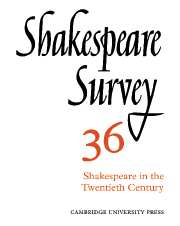Book contents
- Frontmatter
- Shakespeare and the Living Dramatist
- Blood and Wine: Tragic Ritual from Aeschylus to Soyinka
- Hamlet Andante/Hamlet Allegro: Tom Stoppard’s Two Versions
- Auden, Shakespeare, and the Defence of Poetry
- Graves on Lovers, and Shakespeare at a Lovers’ Funeral
- Tragic Balance in Hamlet
- Hamlet Across Space and Time
- Shakespeare’s Scripts and the Modern Director
- ‘He Shall Live a Man Forbid’: Ingmar Bergman’s Macbeth
- Komisarjevsky at Stratford-upon-Avon
- Troilus and Cressida and the Definition of Beauty
- The Pastoral Reckoning in Cymbeline
- New Created Creatures: Ralph Crane and the Stage Directions in The Tempest
- Arden of Faversham
- ‘Pickleherring’ and English Actors in Germany
- Shakespeare Performances in Stratford-upon-Avon and London, 1981–2
- The Year's Contributions to Shakespearian Study 1 Critical Studies
- 2 Shakespeare’s Life, Times and Stage
- 3 Textual Studies
- Index
- Plate Section
The Year's Contributions to Shakespearian Study 1 - Critical Studies
Published online by Cambridge University Press: 28 March 2007
- Frontmatter
- Shakespeare and the Living Dramatist
- Blood and Wine: Tragic Ritual from Aeschylus to Soyinka
- Hamlet Andante/Hamlet Allegro: Tom Stoppard’s Two Versions
- Auden, Shakespeare, and the Defence of Poetry
- Graves on Lovers, and Shakespeare at a Lovers’ Funeral
- Tragic Balance in Hamlet
- Hamlet Across Space and Time
- Shakespeare’s Scripts and the Modern Director
- ‘He Shall Live a Man Forbid’: Ingmar Bergman’s Macbeth
- Komisarjevsky at Stratford-upon-Avon
- Troilus and Cressida and the Definition of Beauty
- The Pastoral Reckoning in Cymbeline
- New Created Creatures: Ralph Crane and the Stage Directions in The Tempest
- Arden of Faversham
- ‘Pickleherring’ and English Actors in Germany
- Shakespeare Performances in Stratford-upon-Avon and London, 1981–2
- The Year's Contributions to Shakespearian Study 1 Critical Studies
- 2 Shakespeare’s Life, Times and Stage
- 3 Textual Studies
- Index
- Plate Section
Summary
In several ways the most penetrating piece of book-length Shakespeare criticism in 1981 is John Russell Brown’s Discovering Shakespeare, a short, essentially modest invitation to explore the plays as texts for performance. A valuable companion to his earlier book Shakespeare’s Dramatic Style,Discovering Shakespeare is addressed to the solitary reader, who must find inadequate, for Shakespeare’s plays, those methods of literary study proper for non-dramatic texts. Brown also focuses attention on the limitations of present-day staging of Shakespeare, a no less topical issue:
The very substance of drama is changeable, and a reader must recognise this fact as much as a dramatist, even though it is more difficult to do so. It is very likely that the reader has never seen actors testing one interpretation against another in rehearsal. Most modern theatres show only productions that are carefully controlled so that they give a clear-and therefore strong-enactment of a single interpretative idea. At school or university the reader may have been trained to read a text so that he can be sure that he understands precisely what is on the page: whereas he should have been encouraged to play with conjecture and to enter imaginatively within a forever-changing image, or mirage, of another life.
(p. 9)- Type
- Chapter
- Information
- Shakespeare Survey , pp. 157 - 172Publisher: Cambridge University PressPrint publication year: 1983



